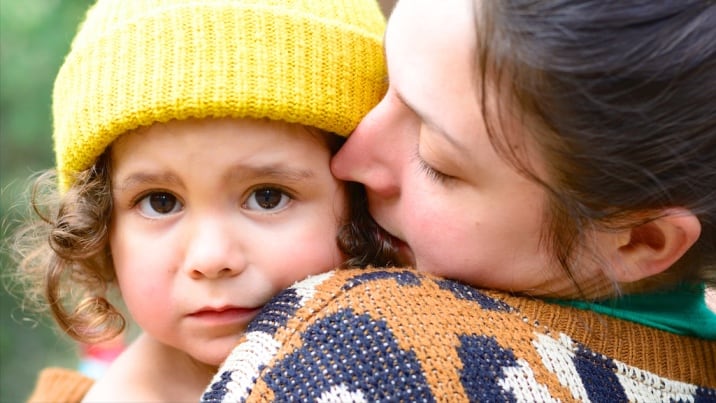Positive parenting is a parenting method that is based on respect and connection.
In positive parenting, unlike in authoritarian parenting children are not threatened or punished, and instead, they are heard and loved.
When there is respect, children naturally learn to respect the parents and as a result, there is better behavior.
Anyone who follows the traditional parenting methods based on fear, physical punishment, and manipulation can validate the fact that these methods are not effective in the long run.
After a while, kids learn to find their ways to evade punishments or may even start to resent the parent, which no parent ever wants to happen.
So if you are expecting to build a great relationship with your child where better behavior is due to love and respect rather than fear, positive parenting is the way to go.
If you are a complete beginner to positive parenting, here is my guide for beginners.
Now, let’s get to the blog post and today I want to discuss the various positive parenting techniques you can learn to master positive parenting.
POSITIVE PARENTING SKILLS EVERY PARENT MUST KNOW
1. CONNECTION
Connection tops my list because almost every negative behavior can be usually stemming from a lack of connection.
When there is connection, children know that we are on their side no matter what.
It is important that parents learn to connect with a child’s emotions to understand what they are going through. If we don’t understand him and help him navigate his emotions, how can we ever nurture the relationship?
Connection means letting kids know that they are loved.
As human beings, we have the need to belong. Our kids have this need too.
If every time a child misbehaves you are threatening to leave him, he senses that he is not that important. He feels estranged.
It is when such basic emotional needs are unmet that they tend to misbehave and learn aggressive behavior. They need our attention and kids try to get your attention through negative ways if we don’t take the time to connect with them.
Building connection is easy. You can set a particular time in a day to give them your undivided attention. If it’s a day off, you can make time for morning snuggles. Or you can make time for connection in the evening when kids get back from school, before bedtime, etc.
Make sure you take ten-minutes here and there from your day for a moment of connection.
Sometimes kids come to you with a problem and that is a great time to connect as well.
So, what are the different ways to show them they are loved?
- Use positive language. Use words to acknowledge and appreciate like “You have been so helpful today, thank you”. It helps them to know they matter and that they belong.
- Make time to laugh. It is easy to make kids laugh. They laugh at the silliest jokes and games, so try to make up instant games and jokes they enjoy. And if it is a hit, you can repeat too. In fact, as a parent, you can expect to run a joke or a silly game forever and ever on request from kids.
- Other activities like reading, playing, cooking, eating meals together, etc. It is important that you spend special one-on-one time with each kid. Each child is unique and their need to connect with you is also unique. Each kid should know that they have a special place in your heart no matter how many kids you have.

2. EMPATHY
Empathy is a very useful positive parenting technique. Empathy means understanding and validating your child’s feelings without any judgment.
As a child of the 90’s I think many of our emotions were not considered valid. Sometimes, even a lot of stigma was associated with expressing our negative emotions.
That’s changing now, which is a good sign.
So whenever a child comes to you feeling angry, sad, frustrated, or happy, always, acknowledge their emotions. Always.
“Oh I see you want to eat the cupcake right now before lunch. I would be tempted too. But mommy needs to make sure something healthier goes to your tummy first. We will keep it next to you so that you can eat it as soon as you have lunch”
“Your sister didn’t share her toys and you are so mad at her”
“Your brother is not giving you space and you are annoyed”
You can show empathy by describing what you see.
You know what your child feels when he explains the situation. So you just acknowledge and name his feelings by saying, “You are feeling _________”.
I always do this and it does magic in lightening up their mood. The instant kids feel heard, they go back to what they were doing or they just feel lighter.
Because that’s one of their needs: to feel heard and to learn that their emotions are valid no matter if they seem difficult.
But sometimes crying can intensify too. But don’t worry, sit with them at this time and let the tears flow. They are capable of soothing themselves after they have let out the emotions completely. As a parent, our role is to offer support.
Now, most parents are used to doing just the opposite. When children express feelings, we say things like,
“Don’t cry for such a silly thing. You are not a baby anymore”.
And this only intensifies his anger or sadness. And he feels things like,
“I am doing something wrong”, or “They never understand me”, “They don’t care if I feel sad, no one loves me”, etc.
We know how this goes because most of us grew up feeling these feelings because many parents didn’t know better.
As a result, children grow up having limiting beliefs about themselves which can last for a lifetime if they don’t get a chance to heal.
I call these statements “magic statements” because they work like magic!
Try this before you take my word.
Usually, tantrums and meltdowns occur when children are unable to deal with the frustration and pain on their own. It is difficult for a parent to sit with it but it’s more difficult for children.
And they don’t know why they feel the way they do. But we can still show empathy, name their emotions, and offer support. This helps kids to develop better emotional intelligence (EI) skills.

3. RESPECT
Respect is one of the cornerstones of positive parenting. Gone are the days where you could give orders and kids obey you without any issues.
If you want kids to comply with your requests and co-operate with you, respect is the parenting skill you need to develop.
Also, it is not a good way to think that kids should obey all your requests and never reason with you. Because learning to speak their truth is an essential skill they need to learn to speak for themselves.
If they don’t learn that they can become people-pleasers in the future. And may even become victims of abuse because they never learned to talk back and stand up for themselves.
But you still want kids to co-operate with you, right? You want them to do the chores, follow their routines without many hassles, etc.
Making them co-operate with you by threatening (if you don’t do this, I will…..) or by punishments make them behave well when you are around.
But we want kids to act responsibly even when we are not around, not only when we are physically present.
We want to raise self-motivated kids. For that to happen, we need to give respect and trust in their ability to look after themselves.
So what are different ways to show respect towards them?
- Let kids make choices on what they want to wear.
- Do not compare them with other kids and respect the fact that they will do it when they are ready
- Respect their body – that means not asking them to kiss relatives if they don’t want to and also no physical punishments. Like any adult, they should be able to decide who they should hug or kiss. Similarly, spanking kids means we are not respecting their little bodies and their resulting emotions.
- Respect their need for autonomy. Give them appropriate choices whenever needed.
- Allow them to take their time even though they move at a snail’s pace
- Allow them to express their feelings without judgment
- Apologize when you do wrong (like yelling, spanking, etc.)
- Include them in the household chores
- Refrain from prying on the matters they don’t want to open up on yet.
In short, think about how you want your kids to respect you. And follow the same rules when interacting with them.
4. POSITIVE DISCIPLINE
Unlike what many think, positive parenting is not letting kids do whatever they want without any restrictions.
Without setting boundaries and without disciplining, kids won’t learn the proper behavior. And they need to experience the consequences of misbehavior too.
We follow positive discipline because we believe kids need to be treated with respect and dignity. In positive discipline, we focus on correcting the behavior of the child and not shame him for his actions.
There are “no bad kids”, only “bad behaviors” is a motto we can follow. Positive disciplining is based on love, connection, and guidance rather than shaming, judging, and punishing.
We try to get to the root of the misbehavior and try to identify their needs and work from there. This helps to change the behavior, unlike the fear-based methods.
The problem of fear-based punishment is, it doesn’t eliminate the behavior but rather it suppresses it. Kids don’t become intrinsically motivated to behave well. They might not do it because they fear punishment.
But what happens when you are not around?
And that’s the difference!
I am not going deep on positive discipline here as I have written a detailed post on what positive discipline is and how you can discipline effectively using 15 techniques that work. Please read the post as it goes deep into the discipline techniques that you can use instead of fear-based methods.

5. SETTING BOUNDARIES
Setting boundaries is important in all kinds of relationships including that between a parent and a child.
Boundaries help children to feel safe. When we establish rules for bedtime, screen time, and other habits, they learn to stay consistent and disciplined in life. Also, such routines help them to anticipate what comes next, so it helps to reduce anxiety in kids.
Like adults, uncertainty creates anxiety in kids. Therefore, setting boundaries help them feel safe. Over time, they learn which rules are worth breaking and which not.
They can sometimes struggle with boundaries and they also try to push the boundaries to see what happens. But their brains are underdeveloped and given a chance they would watch Youtube videos 24×7, setting limits is a parent’s duty without fearing a child’s reactions.
Even though he might not be happy about your decisions at the moment, if you know it is for their best, set limits without fear.
When a child is frustrated because of the limits, as positive parents, we don’t punish but offer empathy. We use positive discipline techniques and try to be “firm, but kind”.
Examples for “being firm, but kind”:
I am sorry you have to stop watching the TV now. But too much time on TV will hurt your eyes and your brain.
I know you would like to spend the whole day with me. I would love that too. But right now, it’s time for mom to work. I will be with you as soon as I am done with it.
I know you love chocolate and you want to eat it now. But I need to make sure you eat some healthy food before that.
When a child feels annoyed by the limits, offer him support, and make him feel loved. After all, it’s from struggles that they learn to be patient, resilient, and disciplined.

6. TEACH THROUGH NATURAL AND LOGICAL CONSEQUENCES
Teaching through natural consequences is another skill you can learn, to parent effectively.
It is a way of teaching kids the consequences of their actions without nagging and without losing your mind trying to be overprotective.
When we let kids experience the consequences of their actions, those lessons have more chances of being imprinted on their minds than the ones you try to instill by lecturing.
So, if your child forgets homework repeatedly for the seventh time in a month, stop helping in the last moment.
Give warnings and tell him,
“I expect you to do your homework on your own at the right time. If you want I can help you with tips to put it on your daily schedule. But I can’t sit with you every time in the late hours to do the homework.
Next time, if you forget the homework, you will have to face the consequences at school”.
And what does the trick is sticking to your word.
I know we all have the parental instincts to help our children when they suffer and we want to erase all their worries just like that.
But it is not what we are here for. We are not also not here to be miserable by nagging kids and feeling like failures when they grow up being irresponsible.
Our role is to give them guidance and sit back and watch when they make mistakes. Let them learn from their mistakes. The valuable lessons they learn from mistakes will teach them responsible behavior.
We can offer empathy when they fail to do homework and when they have to face the consequences. But refrain from “fixing” their mistakes. It’s up to them to do that.
Other examples:
For older kids, if they don’t get up on time for school and miss the bus, let them walk or use public transport.
If they don’t wear a jacket when going out in the cold, instead of engaging in a power struggle, let them experience the consequence so that they know what to do the next time.
But what if they do things that don’t have a natural consequence that they can learn immediately from. Like too much TV, or too much chocolate?
You can use other techniques like setting limits and if they push the limits you can discuss the topic in family meetings or implement “related/logical consequences”.
Logical/related consequences are set by parents and must be related to the misbehavior.
We often say things like “If you hit your sister again, I will cut your screen time”.
These two events are not related. Therefore, the child doesn’t understand the problem. Our aim is not to punish kids by taking their privileges away but to make them understand that their actions always have consequences.
So the consequence must be related and something that kids can connect with their actions.
Cutting screen time can be a logical consequence if they watched more time than allotted.
Another example of logical consequence:
If they throw tantrums at the grocery store, you can choose not to take them the next time when you go.

7. CONSISTENCY
Consistency is important in parenting. Children feel safe when there is consistency in the rules and the consequences you set.
If one day, you let them face a consequence and on another day you decide to bail them out, it sends a confusing message to them.
And when they learn that it’s easy to bend your rules if they push some buttons, they will learn to manipulate you.
So, when setting rules and before you say a NO, make sure if you really mean a NO because kids need to see that you are serious and that you won’t change it to a “whatever” after they say so many “pleeeases”.
Consistency means acting on your words and do what you said you would without giving in to their requests.
But as a parent, there are days when you are overworked or sick and tired and just want to give in. Staying consistent on such days is easier said than done.
That’s why being consistent is not easy.
Decide for yourself what the non-negotiable rules and unacceptable behaviors are in your family. And try to let go of other issues that are petty and not worth fighting for.
Like giving choices for what they want to wear and what they want to eat (as long as it is healthy).
I used to be a parent who micromanaged what my kids did and these days I am learning to let go of little things. It is so much better for my mental health and of course, fewer battles and power struggles with kids.
This way, I have better chances of being consistent because I am no longer worried about petty issues and that saves a lot of energy. When it comes to the non-negotiable rules, you need to think about the long-term benefits if the going gets hard.
Sometimes, when I am tired, I make a mental note of the behavior that I want to follow up with. I bring this up the next day or decide to bring this up in the next family meeting.
You are a human and it is okay if you can’t stay rock-solid consistent 100% of the time. The intention is to let kids teach about the consequences and let them learn that some behaviors are unacceptable no matter what.
The most important part of being consistent is, “less talk and more do”. Instead of talking, immediately put the consequence in action, and then kids know that you mean what you say.
8. POSITIVE LANGUAGE
The way we speak to kids becomes their inner talk for a long long time. The words we use to speak to them have a big impact on how they see themselves and how confident they become in life.
Most of the limiting beliefs we have as adults can be traced back to our childhood where we formed beliefs about ourselves based on the words adults spoke to us.
Sometimes, we say things to kids we don’t really mean. But the sooner we eliminate such phrases from our vocabulary, the better it is for the emotional development of kids.
The sentences like, “You are a bad girl”, “You are so selfish, dumb, mean, etc” can change kids’ beliefs about themselves to negative.
Also, remember to always watch your language around children. Kids internalize a lot of the behaviors of parents. If we are always complaining or talking ill about others, kids absorb such behaviors.
Even when we talk to kids it is best to use positive language. It has way more impact on the behavior of kids than talking negatively.
For example:
Instead of,
“You never do your laundry on time”, you can ask,
“I see your laundry has piled up. What’s your plan to get it done?”
This will invoke a better response from kids than putting blame.
And also, saying a lot of NOs and DON’Ts have the opposite effect of what we intend.
Instead of saying,
Don’t jump on the sofa, say, “Sofa is for sitting”
Don’t hit your brother, say, “Hitting causes pain, we use gentle touch with people”
Don’t yell at me, say, “Can you talk more respectfully?”
In short, focus on the behavior you want instead of what you don’t want.
It is inevitable that we need to correct kids a lot to teach them appropriate behavior.
After a while when you repeat these commands, they start to feel like empty threats and you sound like a broken record. We never want that, we want our words to be taken seriously.
When you use positive language as above, you are also teaching kids what to do instead of the negative behavior. And that is very important.
When we say, “don’t jump on the sofa” the child may not get what’s wrong with jumping on the sofa. But if instead you say, “sofa is for sitting, you can jump on the floor”, they understand why they shouldn’t jump on the sofa and what they can do instead.
Positive language is an important tool you can use in your positive parenting journey. It may feel hard in the beginning, but with constant repetition you can rewire your brain to speak positively.
Another good side effect? Children learn to speak positively too.
Related:
- List of 70 positive things kids need to hear
- How to teach positive affirmations to kids to help them think positively
- 20 things parents should never say to their kids

9. PATIENCE
Once you are a parent, no matter what parenting technique you use, your patience is a virtue that’s gonna be tested more often than you like.
Positive parenting calls for a lot more patience because you don’t want to use harsh techniques with kids. Threatening, spanking and other fear-based methods may show immediate results even though they are ineffective in the long run. And that’s what we use when we are impatient.
Kids need to hear a message a lot of times for it to get ingrained in their minds.
No kids stop drawing on the wall after the first time you tell them. It requires constant repetition and gentle reminders for them to learn the appropriate behavior.
We might feel like kids are deliberately doing it to irritate us despite warning a hundred times. But no, children are yet to develop the self-control and discipline required to not repeat a behavior, even though they seem to know what’s right and wrong. It’s not easy for them either!
If you don’t have patience, you punish them for such behaviors. But when your instinct is to punish, we miss out on the chance to connect with them and address the underlying issues that cause the behavior.
And it is when you are patient that you can stop and reflect on what kids need. That itself will help to reduce the misbehaviors. And also, to be consistent with the message that you are teaching them, you need to develop patience and a lot of it.
Related:
- How to stop being an angry mom
- How to stop yelling at kids when angry
- Is spanking an effective way to discipline kids?
10. POSITIVE REINFORCEMENT
Are we focused too much on the negative behaviors that we don’t see when they behave well?
We encourage younger kids a lot. But I think it wanes when the kids grow and reach teenage. When we catch kids when they do something right and encourage positive behavior, they are motivated to do it more.
In fact, according to the 5:1 rule, for every negative interaction, there must be at least 5 positive interactions to ensure a healthy relationship.
So when you catch your child on a good act, you can reinforce it immediately.
Like,
“Thank you for putting the dirty clothes in the laundry basket without me asking”
“It makes me immensely proud to see that you helped your little sister to learn the new word’s spelling”
Sometimes, you don’t need to use words. A gentle pat on the back, a knowing smile, or high five will do. You can also offer tangible rewards, or give them experiences if they achieve a milestone due to their hard work.
It is important to not overdo on praise and rewards too. A reward should come as an extension of their happiness for achieving a goal not as the sole motivation to achieve it.
Once the child has mastered a skill, you don’t need to reinforce the behavior continuously.
But you can acknowledge good behaviors from time to time.
For example:
“I am so grateful you volunteer to take the trash out every day. It is now one less task for me to bother about”
Positive reinforcement helps kids to know that what they do is seen and heard, and it reinforces their belief that they belong and that they are loved.
More reading:
- How to teach your child to be independent
- Top 12 qualities of a good parent
- How to teach growth mindset to kids
- How to raise grateful kids instead of complaining ones
- 11 easy ways to get kids to listen without yelling or nagging
Like this post? Please take a moment to PIN and SHARE!

